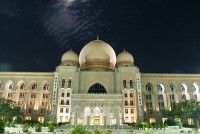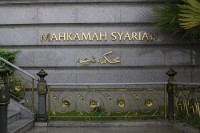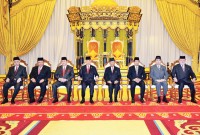Malaysia, I suggest, is a “discourse-impoverished” society.
And, what is more, this impoverishment is the source of many of its problems, and even of the national impasse in which it now faces.
“Discourse”
What do I mean here by “discourse”?
Well, you hear the word a lot these days. Everywhere. But especially in Malaysia. Far too much, in fact. It is on everybody’s lips, constantly.
But, almost invariably, it is used loosely, casually, and inaccurately.
People seem to use it pretty much as synonymous with “chatter”, with whatever it is that people might have to say.
Nobody these days, it seems, has a conversation or puts an argument or has a viewpoint to offer. They have “discourse”.
You have a discourse, yours, and I have a discourse, mine, and people everywhere have theirs.
It sounds grand. Well, to some, perhaps. That is the point of invoking and employing the word so promiscuously, in this debased way. But this common usage is no so much grand as grandiose and grandiloquent, pathetically intended for grand effect.
People’s “discourse”, in this loose and vulgar sense, is simply what they have to say, however vague or diffuse, no matter how banal or incoherent, it may be.
But this is not what, like it or not, in the world that a generation ago was reorganised and provided for us by Foucault, the term “discourse” is now properly understood to convey –– and, again like it or not, as a “pre-postmodernist old grump”, I am well known for not greatly liking it at all!
Something far more precise is intended. At least, that is, by those who, rather than simply wanting to seem up-to-date or striving to impress, really know what they are talking about.
People, that is, who care about words and ideas and about precision in using and handling them.
Discourse, properly understood
“Discourse”, ever since Foucault, has come to mean far more than just an utterance or barrage of personally connected utterances.
Far more than that, a discourse is a form of knowledge, often a deeply-seated way of understanding things or of arranging consciousness of them, that is embedded in and also sustained by a certain way of talking about them. Things are, or become, known from the way we talk about them: through the linguistic structure and semantic architecture of publicly organised consciousness and speech.
A discourse, then, is a form of talking about and hence of “knowing” things that is grounded in and responds to a form of power yet which, at the same time, produces and projects, which regenerates as well as simply ratifies and consolidates, that form of power.
A form of discourse, properly understood, both serves a kind of power that already exists yet also conduces towards realising a form of power that is constantly being created, or recreated, and replenished.
Its relationship to power, then, involves a two-way traffic of reciprocal support. Discourse grows from and expresses a form of power yet also, indispensably, creates and animates it.
This is hardly what the overwhelming majority of people who these days, in Malaysia elsewhere, have in mind when they let the irresistible word “discourse” pass their lips. I sometimes think that, especially in Malaysia, the word “discourse” is used so frequently and freely because, when one puts one’s mind to what the word properly denotes, there is so very little of it.
In this sense, contemporary Malaysia is a “discourse-poor” society, a “discourse-impoverished” culture.
An “over-lawyered” society?
One way to begin to explain this situation is to consider the unusual eminence and influence, the very special prestige and standing, that lawyers have established for themselves in Malaysia.
Without doubt –– the idea is a frequently voiced one –– Malaysia an intensely litigious society. A large part of public life consists of the extravagant issuing, and often the retaliatory counter-issuing, of writs, of threats of dire legal action, and an almost incessant recourse to the making “police reports” against other citizens for holding, or upholding, views that the complainants may find not so much criminal as personally uncongenial.
There is a constant buzz and frisson of legalism surrounding, even pervading and deeply penetrating, Malaysian public life.
Why, I often wonder, is this so?
Is it the lawyers’ fault?
It is easy to sound angry and critical about this situation, but blaming the lawyers doesn’t help very much.
It not just the lawyers and their ways who are responsible. This, more generally, is simply “the way it is”, just how things are.
Why?
There can be no doubting that “the law” is a powerful discourse, a powerful way of thinking and working and producing public effects, in Malaysia.
It is that in many other places too, but here the situation is a little different. Different in a way that helps explain the legalistic domination of public and national life.
The law is just one form of knowledge and professional practice, merely one “discourse”.
In many other societies, the kinds of public issues that the law treats and specialises in managing authoritatively are also matters of central and continuing concern to other forms of knowledge, to other forms of serious discourse and their specialist practitioners.
Take, for example, the hardly trivial example here in Malaysia of constitutional questions –– including those involving religious freedom and pluralism. Certainly these are, par excellence, matters of professional concern to lawyers, to their profession as a whole.
But in most countries exponents of many other forms of knowledge, and many other kinds of specialist expertise and practice, also “weigh into” disputes in this and similar areas: political philosophers and theorists, cultural and intellectual historians, social and cultural analysts and commentators, scholars versed in the history of world religions and in the study of comparative religion, and many others.
But in Malaysia?
These important, internationally recognised forms of knowledge and practice –– highly developed, favourably positioned and well-regarded professional communities specialising in these matters and eager to offer informed expert opinions upon them from their own distinctive standpoints –– scarcely exist.
Legal discourse in consequence looms so large, even overwhelming, because it commands the field in a kind of lofty solitude, not merely unchallenged but virtually without any potential rivals or alternatives.
The legal domination of public life, debate and action is in large measure the result of this situation: of the lack of alternative forms of respected professional knowledge and at least potentially influential practice.
The lawyers’ at times controversial, even resented, domination of public life is less the consequence of how they conduct their elite professional work than of the way that others –– meaning government, via official educational and cultural policy –– have structured, and in other ways virtually denuded, the professional terrain upon which they operate.
The legal domination of Malaysian public life is the result, and a perhaps malign symptom, of a “discourse-impoverished” society and public culture.
How did this situation come about?
One animal in a room or cage will surely consume all the available food, water and oxygen if there are no others there with whom that animal must share what is there to be had, no rivals contesting its enjoyment of virtual monopoly access.
It is the same with lawyers in Malaysia.
So the question to be asked is not “why are the lawyers so dominant?” but “why have all those others kinds of publicly relevant expert knowledge and practice not emerged and developed? Why have they not flourished to the extent that the legal profession is compelled to share the public limelight and official access to influence with them?”
The answer to this question is a complex one. Some parts of it will be noted below. But it is clear that national educational planning and cultural policy have not been keen to foster the flourishing of those other specialist forms of knowledge and empowering “discourse”.
On the contrary, there has been a decided and explicit official commitment not to encourage, but rather to preclude, their growth.
These are fields, government policy leaders have often held, that simply encourage inappropriate and unproductive forms of action, including discontent, and which, pioneered and favoured in the West, may be treated as not merely inconvenient but irrelevant and unneeded in a society committed to Asian, especially Malay and Islamic, values and forms of intellectual endeavour.
Nowhere here in Malaysia’s universities are there to be found world-standard or even, more modestly, internationally acceptable departments and schools of philosophy, including political philosophy and logic, of world history, of global cultural and intellectual history –– and any number of other such fields of expertise that are normally considered indispensable in an internationally respectable university.
There is no need here to diverge into a broad consideration of the dire effects of this situation, of such a policy orientation, upon the development of national life and culture.
The sad consequences and implications are all too obvious.
It suffices here only to state the obvious: that the direct result of this advised neglect, attenuation and restriction of the growth of so many other forms of “humane knowledge”, and of those fields of expertise and forms of discourse, has been the production of an intellectually one-sided or unbalanced society, a lawyer-dominated society.
Of a society where lawyers are not just the principal or key professionals, but the solely relevant and valuable providers of practically relevant expertise across this entire area of human activity and endeavour.
Of a “discourse-impoverished” society in which legal expertise, the kinds of knowledge that lawyers amass and can deploy, is the publicly dominant form of sociopolitical and cultural discourse.
.. .. and what kind of law?
If legal expertise now serves, and has been emplaced, as the nation’s dominant form of “humane knowledge”, what kind of legal knowledge exactly is it, we must further ask, of which we are speaking here?
One main thing is clear.
We are not speaking here of the law as a philosophical activity or field, as a kind of free-wheeling intellectual quest or adventure.
As in so many other places too, but again only more than is often the case (where there is some effective or significant counterbalancing of the “predominant trend” of pure practicality and “instrumental reason”), “the law in Malaysia” is not a philosophically driven undertaking but simply a specialist human technology.
It is just a way, a very fine and impressive and at times even arcane way, of simply “getting things done”. Its ways may be surrounded by a great mystique, but there is no mystery about its overwhelming nature and purpose.
It is, and is there to provide, a way of bringing together and articulating interest, will and strategy –– in the exercise of power: that is to say, of achieving objectives, realising the contesting purposes of different wills; of securing an agenda, an itemisation of things to be done, through the waging of an “agon”, of conflict, contest, contention and antagonism.
It is hugely important, and its conduct can be enormously impressive. But at heart it is nothing more edifying than that. Just a human technology and set of techniques for ensuring “the triumph of human will”. Just a human technology and set of techniques for ensuring “the triumph of human will”. Of human purpose and focused intentionality, in specific and often socially powerful, well-resourced forms.
(To be continued in Part 2)
 Facebook
Facebook  Twitter
Twitter  Soundcloud
Soundcloud  Youtube
Youtube  Rss
Rss 


